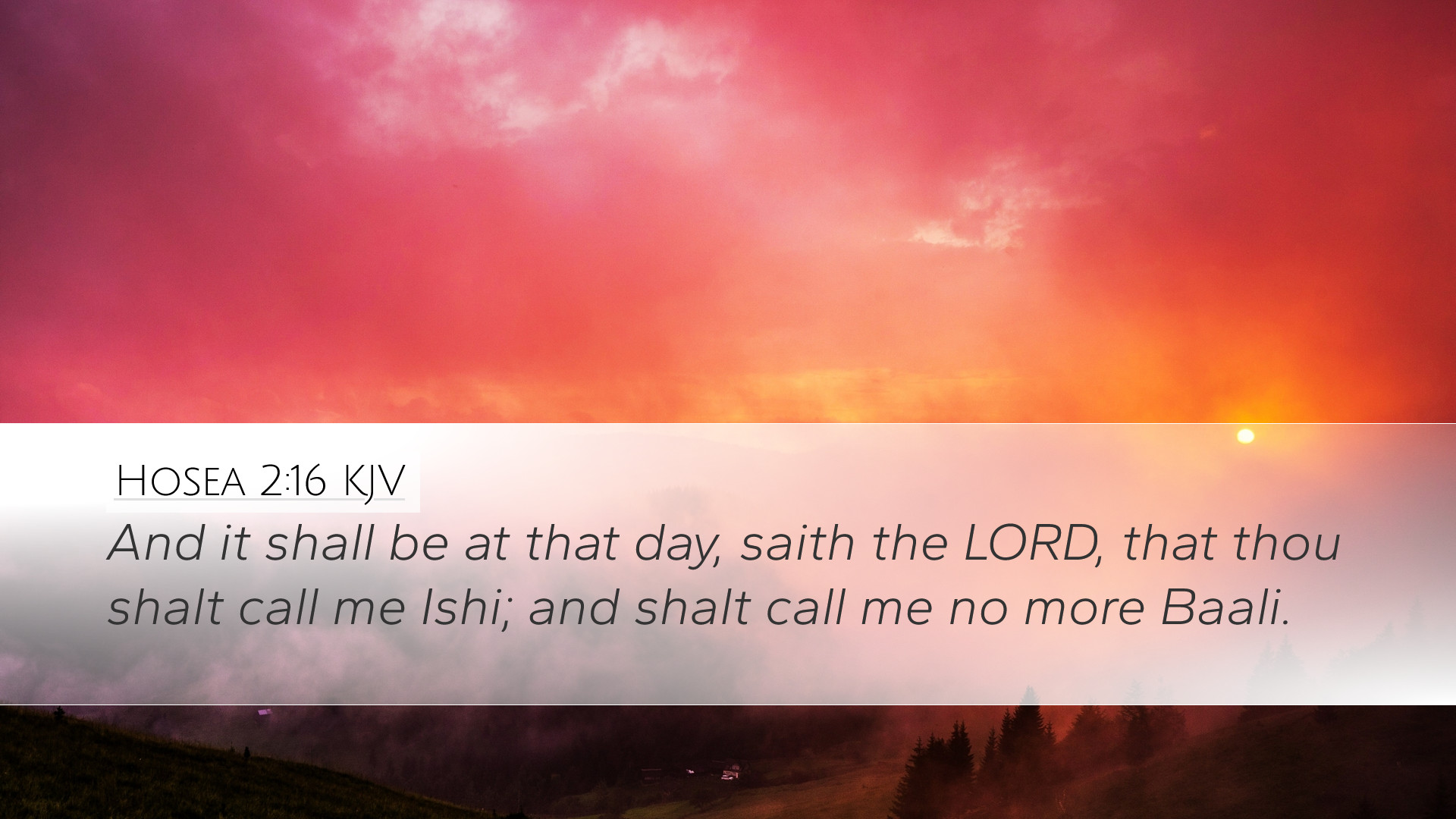Old Testament
Genesis Exodus Leviticus Numbers Deuteronomy Joshua Judges Ruth 1 Samuel 2 Samuel 1 Kings 2 Kings 1 Chronicles 2 Chronicles Ezra Nehemiah Esther Job Psalms Proverbs Ecclesiastes Song of Solomon Isaiah Jeremiah Lamentations Ezekiel Daniel Hosea Joel Amos Obadiah Jonah Micah Nahum Habakkuk Zephaniah Haggai Zechariah MalachiHosea 2:16
Hosea 2:16 KJV
And it shall be at that day, saith the LORD, that thou shalt call me Ishi; and shalt call me no more Baali.
Hosea 2:16 Bible Commentary
Commentary on Hosea 2:16
Verse: "And it shall be at that day, saith the Lord, that thou shalt call me Ishi; and shalt call me no more Baali."
Introduction
This verse marks a significant transition in the relationship between God and His people, Israel. In the context of Hosea, it reflects themes of restoration and intimacy. The shift from the name "Baali," which connotes a master or husband, to "Ishi," meaning my husband, signifies a deepening of the covenant relationship. This commentary will explore this verse through insights gleaned from public domain sources, providing a comprehensive examination for pastors, students, theologians, and Bible scholars.
Thematic Overview
The transition of names represents not just a change in terminology but a profound shift in understanding and relationship. The name "Baali" reflects servitude under a master, whereas "Ishi" symbolizes intimacy, love, and personal connection. This commentary draws from noted biblical commentators to elucidate these themes.
Matthew Henry's Commentary
Matthew Henry emphasizes the significance of the relational title used in this verse. He notes that:
- Redefinition of Relationship: The name change signifies a transformation in how Israel perceives God. Instead of viewing Him merely as a powerful deity, they are invited into a relationship characterized by love and commitment.
- Hope for Restoration: Henry highlights that this promise from God indicates hope for the Israelites’ restoration. Despite previous disobedience, God desires a return to a close-knit relationship, indicative of grace and mercy.
- Implication of Worship: By calling God "Ishi," the Israelites are urged to abandon their false idols and superficial worship, returning instead to a genuine acknowledgment of His sovereignty and love.
Albert Barnes' Notes on the Bible
Albert Barnes provides a theological perspective, indicating that:
- Contrast in Names: Barnes elucidates the meaning of "Baali" as "my lord" and contrasts it with "Ishi," noting that the intimate nature of this latter title reflects the deep affection God seeks from His people.
- Call to Relationship: He interprets this passage as God’s yearning for a personal relationship, devoid of fear and obligation. In calling God "Ishi," there is an invitation to approach Him as a loving partner rather than a distant authority.
- Covenantal Significance: Barnes underscores that this verse reinforces the covenant nature of Israel’s relationship with God. The change of name is like a renewal of vows, stressing fidelity and loyalty over ritualistic worship.
Adam Clarke's Commentary
Adam Clarke provides practical application of the text, noting that:
- Intimacy Required: Clarke points out that true worship arises from a heart of intimacy. Recognizing God as "Ishi" calls believers to develop a relationship steeped in trust and affection, suggesting that our prayers and devotions should reflect this closeness.
- Misplaced Allegiance: He warns against the dangers of calling God "Baali," which is indicative of syncretism and a danger of reducing the divine to a service relationship. Clarke stresses that true fidelity involves recognizing God’s unique role in the life of believers.
- Enduring Nature of God’s Love: Clarke’s commentary highlights that God's commitment to His people persists despite their shortcomings. This verse encapsulates a divine invitation to return to deeper faith, emphasizing God's unconditional love.
Theological Reflections
Collectively, these commentaries reveal deep theological insights into the nature of God and His desires for His covenant people:
- God’s Relational Design: The transformation in naming speaks to God's design for relationships to be personal and loving. This desire for relational depth is foundational to the biblical narrative.
- Call to Authentic Worship: The shift from "Baali" to "Ishi" challenges modern believers to examine their own worship practices and motivations, ensuring that their faith is not merely ritualistic but rooted in relational understanding.
- Hope and Restoration: The verse serves as a reminder of hope. No matter the past failures, the invitation to call upon God as "Ishi" indicates that restoration is always possible within the framework of divine love.
Conclusion
Hosea 2:16 encapsulates a movement from superficiality to a depth of relationship that is both challenging and transformative. It calls the reader to re-evaluate their understanding of God, moving beyond titles of servitude to embrace a personal and intimate relationship. Such insights from Matthew Henry, Albert Barnes, and Adam Clarke inspire believers to pursue a deep, affectionate relationship with God, ultimately transforming both personal faith and communal worship. As Hosea articulates this divine invitation, may modern readers respond with hearts open to the profound love encapsulated in calling God "Ishi."


